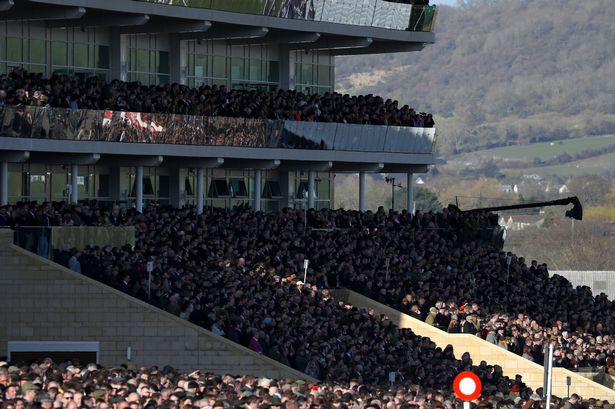[ad_1]
The first case of coronavirus in Wales was confirmed on February 28, 2020.
But it wasn’t until 24 days later, on Monday, 23 March 2020 that the UK entered its first nationwide lockdown.
A week before that on March 16, Boris Johnson told people to work from home if they can, and minimise social contact.
There was effectively a two week period at the beginning of March where large events took place in Wales. These are the big events that went ahead and could potentially have been super spreaders:
Liverpool vs Madrid
An Atletico Madrid fan wearing a protective mask in the stands
(Image: PA)
Unbelievably, on March 11 Liverpool’s Champions League match with Atletico Madrid went ahead with over 50,000 fans in attendance – 3,000 from Madrid, where a partial lockdown was already in force.
While there is no confirmed link between the match and any coronavirus cases, the government’s deputy chief scientific adviser, Angela McLean, said it warranted further investigation.
“It will be very interesting to see in the future, when all the science is done, what relationship there is between the viruses that have circulated in Liverpool and the viruses that have circulated in Spain,” she said at the UK government’s daily coronavirus news briefing on Monday April 20.
It has now been revealed that in the three months leading up to the UK’s coronavirus lockdown, of the 18.1 million people who arrived in the country, just 273 were placed into quarantine.
Chief scientific adviser to the UK Government Sir Patrick Vallance said the UK received a “big influx of cases” from Europe that “seeded right the way across the country”.
Wales vs Scotland game
The match was cancelled at the last minute
(Image: WalesOnline/Rob Browne)
Despite warning signals flashing red across the world, the Wales v Scotland game was still planned to go ahead on March 14 at the Principality Stadium in Cardiff.
Wales’ health minister Vaughan Gething had said he plans to go. Scotland fans were already on their way to Wales by March 12 for the sell-out Six Nations rugby clash.
All other sport in Wales had been called off. Even children’s football was cancelled for the weekend coming. Professional and amateur games at all levels were scrapped.
Yet it was only the following day, Friday March 13, with Scotland fans already packed into Cardiff’s bars that the WRU issued a statement to say that the game would not be going ahead.
It left hundreds of Scottish visitors in the city, with nothing else to do but gather and enjoy what the city had to offer in its pubs and clubs instead.
At this point in the pandemic, widespread testing wasn’t available like it is now so it is hard to show how rapidly the virus was spreading on cases alone.
We do now that in Wales on March 21, 2020, 75 people tested positive for the virus in Wales, a week later that number had doubled and stood at 167 new daily cases.
As far as deaths related to the coronavirus were recorded at this time, on March 21, seven people were reported to have died from the virus in the last 24 hours. By March 28, that daily number was 15.
In Scotland, the situation was very similar, and the first confirmed death of a Scottish patient with Covid-19 was reported on March 13, just 12 days after the first case was identified in the country.
Cheltenham races
Crowds in the grandstand at Cheltenham Racecourse
(Image: PA)
Despite rising cases of people confirmed to have tested positive for coronavirus across the UK, between March 10 and March 13 Cheltenham Racecourse held their annual event – playing host to over 60,000 people each day.
By April 21, mortality figures compiled by the Health Service Journal showed that Gloucestershire hospitals NHS trust, which covers Cheltenham, has recorded 125 deaths, roughly double that in two nearby trusts at Bristol (58 each), and those covering Swindon (67) and Bath (46).
In April last year, a former chief scientific adviser said the Cheltenham festival may have helped to “accelerate the speed” of coronavirus.
Stereophonics gig
One of those events took place over a two day period on March 14 and March 15 at the Cardiff Motorpoint arena.
Despite what we know now about mass gatherings leading to an uptake in Covid cases, at the time, the gig was following public health advice available, and a spokesperson for the band said calling it off “wasn’t our call”.
Just a day later, on March 16, the first patient in Wales died.
Over a month later, an intensive care consultant described letting the gig go ahead as “downright insane”.
David Hepburn, who works at the Grange Hospital in Newport said: “With retrospect, as disapproving as I was at the time, the decision of Stereophonics to play those gigs in Cardiff at the start of the outbreak seems downright insane now.”
Have any of these events been investigated as a result?
We asked Public Health Wales if any of the events held in Wales had been investigated or if there was any research conducted into their impact.
As of yet, nothing of the kind has taken place.
A Public Health Wales spokesperson said: “There has been no research done into the impact of specific large gatherings of people at events in March 2020, however the evidence is clear that where groups of people are not able to social distance effectively then this provides multiple opportunities for viruses, such as Covid-19, to spread extremely quickly.
“Therefore in order to avoid transmission of the virus, the regulations do not currently allow gatherings of people who do not live in the same household.”
[ad_2]
Source link



